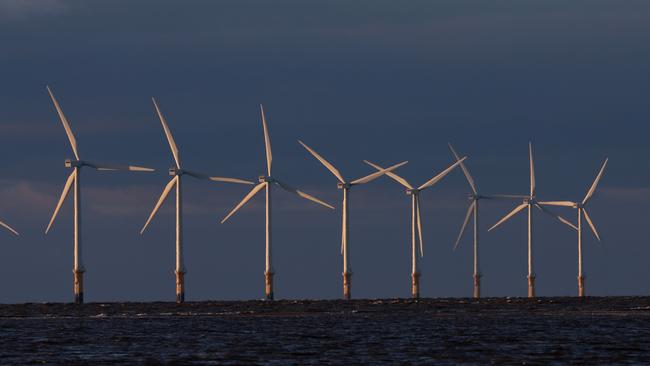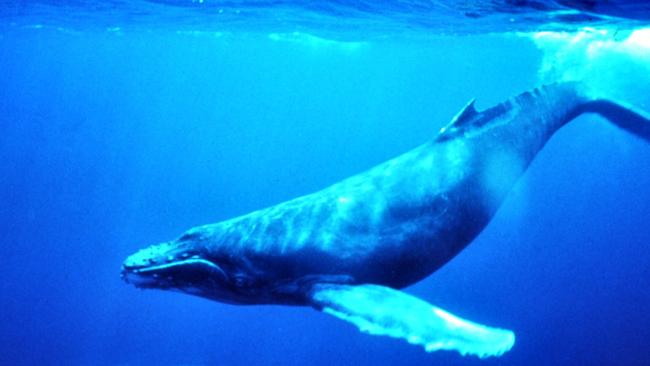Vikki Campion: Environmentalists all at sea on ocean wind towers
Highly inefficient wind towers are detested on land, so governments are turning to the sea for sites — where they will wreak havoc on marine ecosystems, writes Vikki Campion.

Opinion
Don't miss out on the headlines from Opinion. Followed categories will be added to My News.
Which bumper sticker wins on the back of an SUV: “Save the Whales” or “Net Zero Now”? It’s all compassion until the chosen path dictates destruction.
Detested on land, governments are now turning to the sea to build highly inefficient wind towers.
If they are so virtuous, put them where transmission losses would be smallest — closest to the city at Fort Denison, North Head, Middle Harbour, Brisbane River or St Kilda Beach — and let the low-grade industrial hum serve as a reminder of how committed the seats who voted for them are.
Why should the problem be forced upon a faraway ecosystem, which you will pay for in an ever-escalating power bill as Climate Change Minister Chris Bowen continues the mantra that power prices will come down?
Offshore wind will take decades to build and will only operate 45 per cent of the time with any east coast high to lull them into a salty, rusting standstill.
We hear the outcry if a coal mine threatens a bird, a dam threatens a frog, or affordable housing threatens areas deemed possible koala habitat. Snowy Hydro 2.0 was partially delayed due to a native rodent forcing workers to down tools at dusk.
Yet wind turbines, which have been found in scientific literature and courts in Australia and overseas to kill native birds and bats, are given a free pass for destruction.

In an exclusive survey by Compass Polling for this column, just over a quarter of respondents (26 per cent) said no wind or solar project should be blocked, even if they damaged or threatened native flora and fauna.
Nearly one in three Labor and Greens voters said building wind and solar farms over habitats was more important than protecting native species because renewables, which have no viable recycling opportunity at the end of their short lives, would combat the climate emergency.
Forty per cent of 18 to 24-year-olds surveyed said that wind farms should be built no matter what. That approval rating drops with age, halving once people reach 55.
Those university-educated respondents enjoying an income of over $160,000 a year have the cognitive dissonance to vote to save the planet and destroy the non-human life that calls it home, while those earning under $70,000 thought native habitats should come before wind turbines.
How do we on the one hand have land without eucalyptus deemed koala habitat locked in perpetuity, but when it comes to how turbines affect ocean life, such as the blue whale population that remains at just 2 per cent of pre-whaling numbers, those who claim to be conservationists turn a blind eye?

Poor former opposition assistant environment spokesman Josh Wilson, who was recently trotted out to represent the Albanese government at the International Whaling Commission with a speech about the “joy and environmental communion” of whale watching, promising Australia was “committed to continuing its leadership in the global protection and management of whales”, and resolving to do all it could to reduce all marine pollution.
Not even a fortnight later, his colleagues committed to an offshore wind farm where noise pollution, according to recent US scientific papers, could displace whales and their entire food chain.
After the Labor government announced a new Environmental Protection Agency to make development decisions, Bowen announced an offshore wind farm near Gippsland, granted major project status to reduce “unnecessary” regulatory delays.
Those who breathlessly pant “listen to the science” over climate change are obstinately defiant to academic findings of wind farms causing “cascading impacts on the food chain”.

The Whales and Wind Turbines paper published recently in the US by eminent academics found whales could be negatively affected by disturbances from noise related to offshore wind energy development near Rhode Island, and further research was needed to see “if wind farms alter the habitats”.
As whale populations still recover, the industry of watching them swim along our west and east coasts towards the feeding grounds of the Southern Ocean Sanctuary is now worth tens of millions of dollars.
It was economics that stopped whaling, but neither environmental laws nor economics are being applied to wind turbines.
It was mineral oil and agriculture that saved the whale – petroleum superseding whale oil as lamp fuel and sheep promising a better return from wool.
Whale oil prices fell as natural gas and kerosene availability rose.
Coasties over the age of 60 still remember the start of whale season sounded not with the yells of excited tourists upon seeing a whale, but with explosions of a grenade screwed into the head of a harpoon that went off four seconds after hitting the whale.
It took four seconds for a whale to go from being a mammal at the top of the food chain, to just barrels of oil, bones and pet food.
Now they are collateral damage so that a generation that screams about the environment can put their feet up in airconditioning after Christmas lunch and watch stories about them on TV.
Australian courts have already determined that wind farms do impact native populations.
Like the Tasmanian Environmental Protection Authority ordering a five-month closure each year on a proposed Robbins Island wind farm to stop the deaths of migrating orange-bellied parrots.
Have we done the research to understand how whales will pay this time?
If wind farms are essential to build “no matter what”, then put your heavy environmental conscience in your own suburb.
Not only would they be faster to build in inner Sydney, Melbourne and Brisbane, especially once you knocked down a couple of heritage-listed homes and closed the main streets to trucks, but they would also prevent line losses, save billions of dollars avoiding an underwater mini-grid linked by high-voltage cable – and you get to admire and listen to your virtue day and night.
Got a news tip? Email weekendtele@news.com.au



